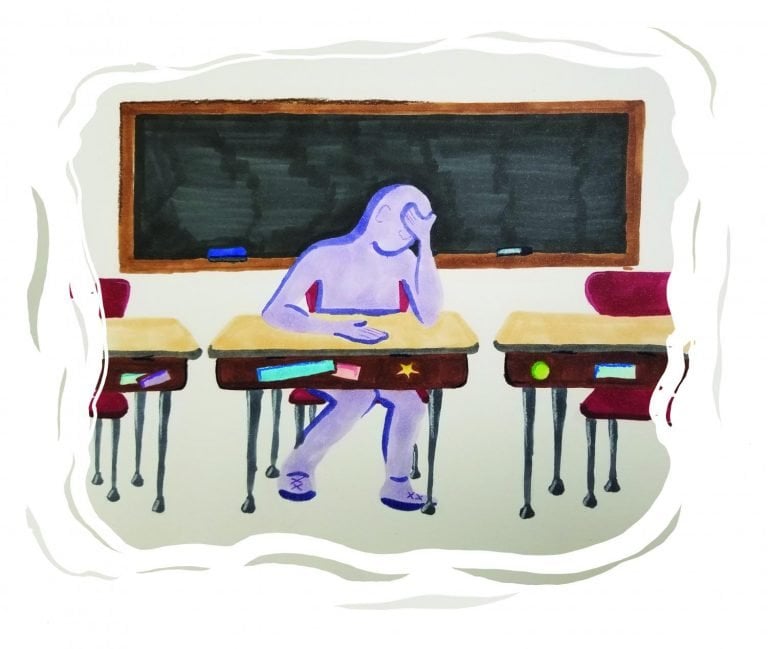As D219 data shows disproportionate discipline of Black students, security task force member says they are “set up to fail”
Daily file illustration by Roxanne Panas
At an equity committee meeting Tuesday, a co-chair and facilitator of Niles Township High Schools District 219 said she feels like the task force was set up to fail.
January 20, 2021
The Niles Township High Schools District 219 Safety and Security/School Resource Officer task force — which seeks to reform the district’s current security model — has been “set up to fail,” a task force co-chair said at a Tuesday equity committee meeting.
The group was created last September to evaluate the district’s security system, including the use of school resource officers in Niles Township high schools, and comprises staff members, parents, a student and other community members. After hearing from administrators, deans and site supervisors, the group will recommend a restructuring of the district’s current safety model to create a system that is safe and supportive of all students and staff.
But Angie Hankes, a task force facilitator and co-chair, said she has had difficulty communicating with administrators.
“Sometimes it takes weeks to get a response,” said Hankes, a non-voting member of the group. “I feel that many administrators are also scared of the task force, and they are very apprehensive to come and speak and present things that the task force need to know, so that’s holding things back.”
Hankes’ comments come amid discussions of racism in the district. In partnership with the Evanston NAACP branch, Black and brown parents held a press conference last week demanding the board address racist practices and remove school resource officers from district schools.
Niles West principal Karen Ritter and Niles North principal James Edwards presented school suspension data, which demonstrated a disproportionate number of Black students facing disciplinary action. Black and brown parents have said this over-policing puts Black and brown students at risk of entering the school-to-prison pipeline.
Before the COVID-19 pandemic interrupted in-person learning, Ritter said the schools were working to implement restorative practices and lean away from punitive measures. Both principals said staff need to address their internal bias and focus on empathy, recognizing the underlying reasons for student behavioral issues.
While building relationships to support a restorative approach will take time, Ritter said the district needs to move in this direction now and repair the harm it has inflicted on students of color. She suggested the district hire a new dean to handle these matters.
“The overrepresentation of Black students being disciplined is not because they’re doing more things wrong,” Ritter said. “It’s because they’re being singled out more often for things that many students do. I really do think it’s because of implicit bias.”
At the Jan. 12 board meeting, board member Jill Manrique, who has been outspoken about social justice and racism in the district, spoke in favor of removing police officers from schools.
Manrique said the district is only listening to White parents and ignoring the demands of marginalized community members.
“We still have SROs, no matter how many times Black students, Black parents, Black alumni tell you, tell us that SROs are harmful,” Manrique said. “When trans students tell us SROs are harmful, we still sit here and listen to White parents tell us that police are the good guys.”
The board also discussed an anti-bias training policy for board members, under which members must complete six hours of training in the first year of their first term, and four hours in each subsequent year. The policy will be further discussed at a meeting next month.
“Part of our culture is, always get trained,” La Wanna Wells, the district’s chief equity officer, said. “But we need to always continue.”
During public comment, community members praised Well’s work and expressed frustration with the board’s reaction to last week’s press conference.
Several found issues with the responses of board member Richard Evonitz, who called the protest “divisive” and “wrongheaded,” and board member Joseph Nowik, who said it was a “preemptive stunt” put on by community members who he said had not previously discussed the matter with the board, despite group members’ claims that they’ve reached out to board members numerous times since June.
“Each time you had the opportunity to address and acknowledge the outcries of Black and brown parents and community members over the last six plus months, you failed to do so,” community member Natasha LaVallias said. “I hope you look deep within yourselves, because my daughter and other Black students and staff experiences do not cause for patience, but for you to act now.”
Email: [email protected]
Twitter: @delaneygnelson
Related Stories:
— Black and brown parents pressure D219 board to address racism
— YWCA talks racial healing and reparations
— D65, city leaders see escalation in hate crimes, prepare security for Inauguration Day


